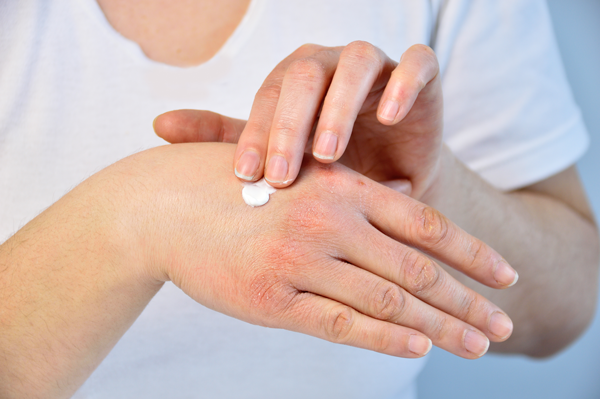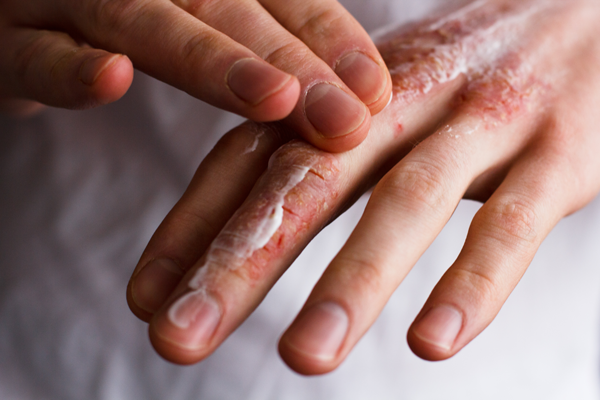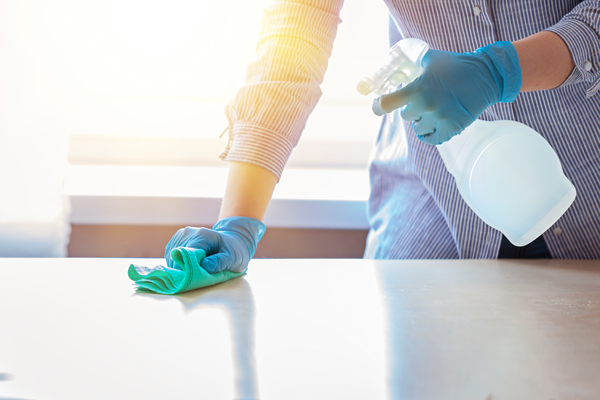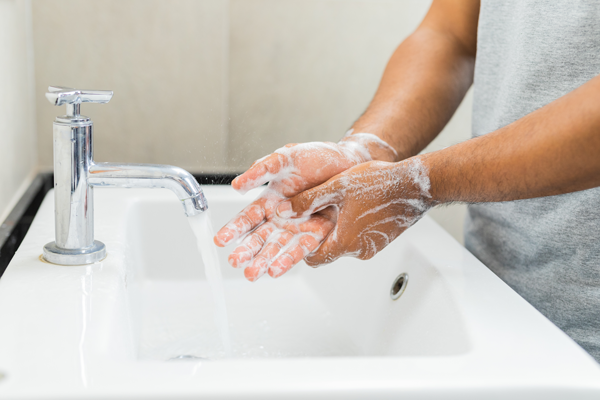Proper handwashing is one of the best ways to prevent spreading viruses, like the new coronavirus (COVID-19) and the flu. But when you have a skin condition like eczema (atopic dermatitis or dyshidrotic eczema), washing your hands often can lead to dry and cracked skin, itchiness, pain and possibly infection. So how can people with eczema protect their skin while protecting themselves from the coronavirus?
The Asthma and Allergy Foundation of America (AAFA) asked Dr. Jonathan Silverberg, a member of our Medical Scientific Council, what people with eczema and other skin conditions need to know about handwashing and COVID-19.
The World Health Organization (WHO) and Centers for Disease Control and Prevention (CDC) are recommending frequent handwashing to protect from the flu and COVID-19. But this can cause flare-ups for people with eczema. What do you recommend people with eczema do to prevent eczema flares on their hands while practicing good hygiene?
My personal and professional experience has been that handwashing is generally better than hand sanitizer, especially when you apply moisturizer right after. Applying moisturizer after each handwashing can offset much of the drying effects of handwashing. I typically recommend my patients carry a pocket tube of moisturizer that would allow them to apply it anywhere.

Are there certain types of soaps people with eczema should avoid? Should they avoid hand sanitizer too?
Many of the antiseptic washes and antibacterial washes are quite harsh on the skin. In general, the antiseptic ingredients are not needed for proper hand hygiene if you use proper technique, (i.e., wash with soap for 20 seconds, use warm water, etc.). The U.S. Food and Drug Administration (FDA) has even been reviewing whether these ingredients are appropriate for over-the-counter cleansers. But, under the circumstances of the current outbreaks, you may only have access to some of the harsh antiseptic washes. As such, the pros of proper hygiene and prevention of disease transmission outweigh the cons of irritation from such products. But, applying moisturizer after each wash can reduce much of the drying effects.
What are the steps people with eczema should take to properly moisturize after washing their hands?
After washing your hands, you should pat dry with a disposable paper towel or tissue. It is best not to rub dry as this is traumatic to the skin aside from the harm of frequent water exposure. Once mostly dry, (i.e., your skin is still a little damp) apply a generous amount of moisturizer to coat the entire surface of your hands and fingers. The choice of moisturizer largely depends on your preference and what is practical for daytime use and carrying out activities of daily living.

Some people wear disposable gloves and use hand sanitizer on those gloves. This used to affect the integrity of latex gloves. Is this the case for nitrile or vinyl gloves? Is this a valid and effective way for people with eczema to protect themselves while avoiding flare-ups?
I am not sure if it affects the integrity of vinyl or nitrile. But, I am not a fan of this approach. When we apply hand sanitizer on our bare skin, we can feel if we covered the entire surface of the hands and fingers. But, when wearing gloves, we limit the ability to feel this and might miss some spots on the gloves and then accidentally carry some germs. I think it makes the most sense to either change gloves and/or wash or sanitize hands often, rather than to wash or sanitize gloves.
If the hands of a person with eczema do become dry and cracked, should they call their doctor? How should they treat it to avoid infection?
Good integrity of the skin barrier is an important aspect of hand hygiene. People who are prone to having hand eczema or atopic dermatitis flare-ups from using harsh soaps or frequent handwashing should be proactive and apply moisturizers to help maintain the skin barrier and prevent eczema flare-ups. But, if that is not enough, they may need prescription topical therapy to reduce the inflammation in eczema.
What should people with eczema do while cleaning to protect their skin while working to prevent the spread of respiratory illness?
People should always wear gloves when using antiseptic wipes and cleaning products. These can be very harsh upon contact with your skin.

Should people with hand eczema carry travel bottles of the soap and moisturizer that works best for them so they can wash their hands in public?
I often recommend this to patients who are sensitive to different products. But, in this outbreak scenario, there are two more considerations. First, it is important that people properly clean their hands before applying moisturizer in order to prevent contamination of their products with harmful germs. Second, it is important that people also clean and/or sterilize the outside of the containers they are using to carry around soaps and moisturizers. Otherwise, they run the risk that these tubes may carry harmful germs on their surfaces.

Some biologic treatments can suppress the immune system. Is this true with dupilumab (DUPIXENT®)? Are people on dupilumab for eczema (or biologics for other conditions) at risk for the flu, COVID-19 or other respiratory illnesses? If so, how should they protect themselves?
Based on the data from multiple clinical trials, dupilumab is generally not an immunosuppressant and was not associated with higher rates of infection overall. But, there were slightly higher rates of nasopharyngitis (colds), upper respiratory tract infections and cutaneous herpes virus infections (cold sores). There is not enough evidence on whether dupilumab would have any impact on the risk of transmission of COVID-19 or related illnesses. For all my patients who are currently on dupilumab, I am not recommending discontinuation or changing doses. If a patient is confirmed to have COVID-19, I would consider holding dupilumab until the COVID-19 is resolved.
Jonathan Silverberg, M.D., Ph.D., MPH, is an associate professor of dermatology and director of clinical research at the George Washington University School of Medicine and Health Sciences.





Comments (21)